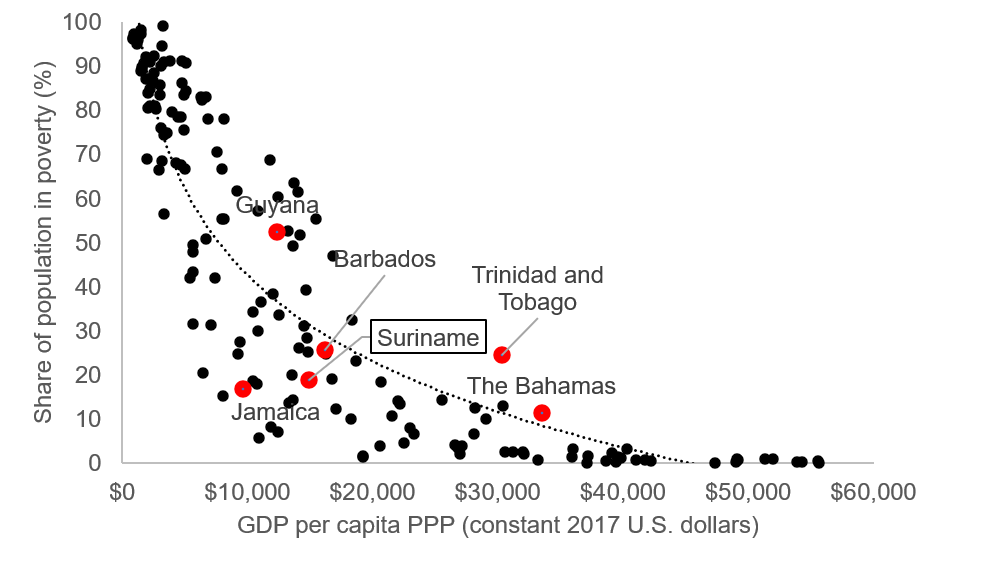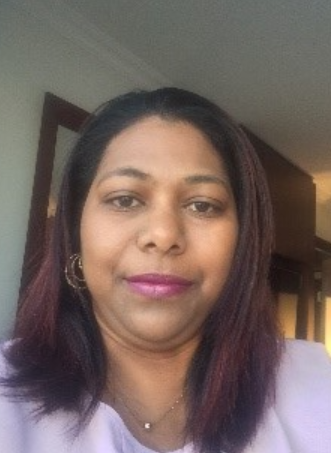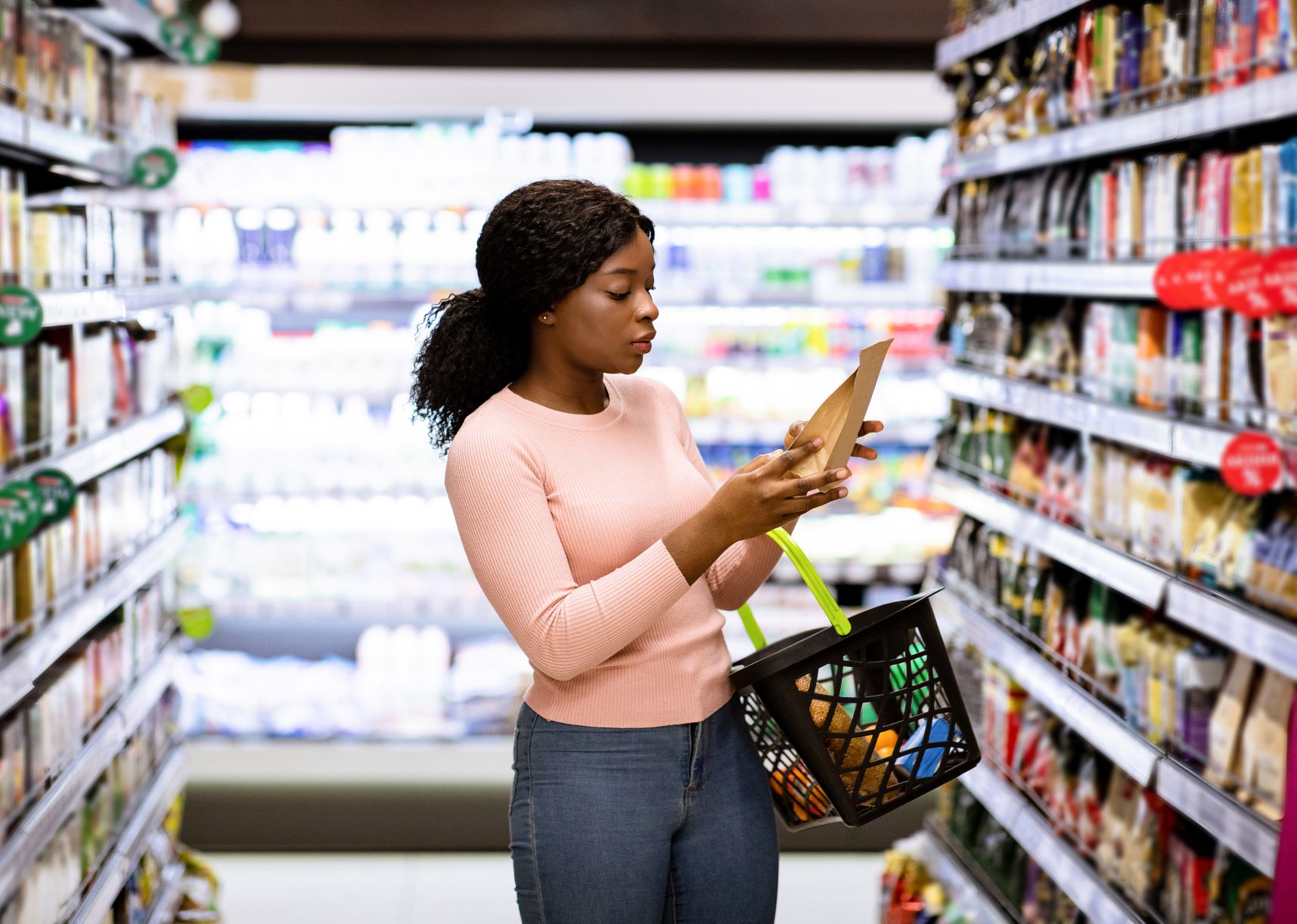To design effective policies that can improve the living conditions of households and individuals, it is crucial to keep track of the changing realities on the ground. Surveys are a powerful tool for that. In the case of Suriname, the country faced several challenges in the past few years. The country’s Gross Domestic Product (GDP) per capita, which reached its peak in 2014, plunged sharply in 2016, triggering a series of economic hardships. To cope with the situation, Suriname adopted a tough macroeconomic stabilization program, while experiencing soaring inflation. On top of that during the COVID-19 pandemic, severe lockdowns took a heavy toll on the well-being of Suriname’s people. A phone survey conducted at the peak of the pandemic by the Inter-American Development Bank (IDB) in August of 2020, revealed alarming signs of worsening employment, shrinking businesses, and falling remittances.
Below we present how this survey was carried out and how it can shed light on the quality of life of Surinamese people.
The 2022 Survey of Living Conditions
In 2022, the Inter-American Development Bank (IDB) collected data for a new nationally representative household survey – the Survey of Living Conditions. Over a 12-month period, a questionnaire was administered to approximately two thousand, five hundred Surinamese households. The questionnaire queried many aspects of households’ current situation, such as health, early childhood development, labor supply, housing, migration, consumption patterns, income and expenditure, among others.
How was the data analyzed and what does it show?
The IDB and the World Bank jointly undertook initial data analysis, focused on poverty and inequality. To estimate poverty rates, research teams looked at the value of total daily real consumption and classified people as poor if this value lies below a certain threshold – the poverty line.
Estimating the total value of real consumption is challenging. The questionnaire asked households about a wide range of consumption and expenditures on food, non-food (think of clothing, energy, ICT and transportation), and housing. It is not easy to condense this extensive and complex information for thousands of households. To see why, consider for instance food consumption. Households consume many different types of food. Some of this food is bought in shops, some of it is consumed in restaurants, and some of it may be produced by households themselves. And, to add to the complexity, due to high inflation a household had to pay SRD 15 in December 2022 for the same basket of goods that cost SRD 10 in January of 2022. Fortunately, best practices have been developed over the years in countries around the world to deal with these challenges.
The research teams compared the value of individuals’ consumption to various poverty lines. One of these is the World Bank’s international poverty line for upper-middle income countries, such as Suriname. The value of this line is US$6.85 per person per day. (To be precise, the value of the line is US$6.85 in so-called 2017 PPP US dollars. Click here for explanation) This poverty line is equivalent to SRD 119.13 in September 2023 prices, or SRD 3,623 per person per month. The first, conservative estimates indicate that for 18.9 percent of Suriname’s population the daily value of their real consumption lies below this threshold. The picture does not differ much when applying Suriname’s national moderate poverty line or the IDB’s moderate poverty line.[1]
Is this a high poverty rate and does it reflect Suriname’s reality? To answer that question, one can compare the poverty rate in Suriname to that in other countries. When making the comparison, it is insightful to take countries’ level of development into account in order to avoid comparing apples and oranges. As shown in the chart below, Suriname is situated approximately where we would expect it to be considering its annual GDP per capita (a common measure of development).

Source: Latest poverty rates and corresponding PPP adjusted GDP per capita from the World Bank’s WDI Databank. For Suriname: SLC 2022.
The IDB and World Bank research teams also used the Survey of Living Conditions to examine other areas of deprivation. Healthcare and education emerged as important policy priorities with households frequently indicating that they have a chronically ill or disabled household member and signaling insufficient health insurance. It was also common for heads of households to have either low levels of education or minimal information, communication and technology skills. These challenges are all connected. Adults in poorer households tend to have lower education and worse job opportunities and poorer households have less access to private health insurance and worse internet access. Indeed, the findings suggest that roughly four out of every 10 individuals in Suriname face significant unmet needs in other-than-consumption dimensions of wellbeing.
What’s next?
This initial analysis is not an endpoint. It is the start of deeper data validation, exploration and collaboration with key Surinamese stakeholders on topics of high policy relevance. The IDB is currently making an anonymized version of the dataset publicly available https://mydata.iadb.org/Social-Protection/2022-Suriname-Survey-of-Living-Conditions/prbn-x74x . Interested groups and individuals are invited to independently use the data or connect with the IDB and the World Bank on specific policy questions. The teams also welcome efforts by others to validate the initial findings discussed in this blog.
Note: The findings discussed in this blog are subject to change. The international poverty numbers discussed in the blog have not yet been formally approved and included in the World Bank’s global poverty indicators.
The authors of this blog would like to thank the institutions and colleagues who made the data collection and analysis possible. Data were collected by Sistemas Integrales Ltda and DataFruit. Data analysis was supported by Carlos Sobrado, Trinidad Berenice Saavedra Facusse, Santiago Garganta, Laura Valentina Clavijo Torres, and Mateo Uribe Castro.
[1] Suriname’s national poverty line varies with household structure but on average is equivalent to SRD 4,112 per person per month expressed in September 2023 prices. The IDB’s moderate poverty line varies by geographic location but on average is equivalent to SRD 4,103 per person per month expressed in September 2023 prices.
Invited Authors

Jacobus de Hoop is a Senior Economist in the World Bank’s Poverty and Equity Global Practice. At the World Bank, Jacob currently leads the Gender Innovation Lab for Latin America and the Caribbean and supports the organization’s program in Belize, Costa Rica and Suriname. Before joining the World Bank, Jacob worked as a humanitarian policy research manager at UNICEF Office of Research – Innocenti, was a member of the Transfer Project, worked as a researcher at the International Labour Organization (ILO), and was affiliated with the Paris School of Economics as a Marie Curie Post-Doctoral Fellow. He holds a Ph.D. in Economics from the Tinbergen Institute and VU University in Amsterdam.

Rosita Sobhie is a Senior Researcher and the Dean of the Interfaculty for Graduate Studies and Research of the Anton de Kom University of Suriname. Her main research areas are poverty and inequality, macro-economic modeling, and forecasting, developing issues for small open economies, and changing attitudes in gender and ethnic roles in society. As a member of the National Poverty Commission of Suriname her main contribution is to provide technical support to the team regarding accurate poverty line measurement and targeting programs.


Leave a Reply